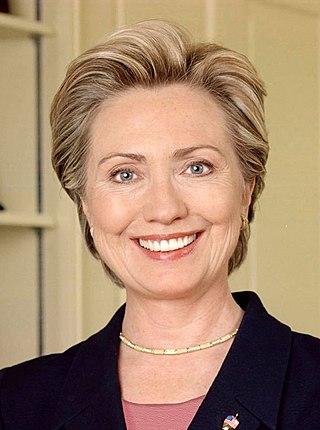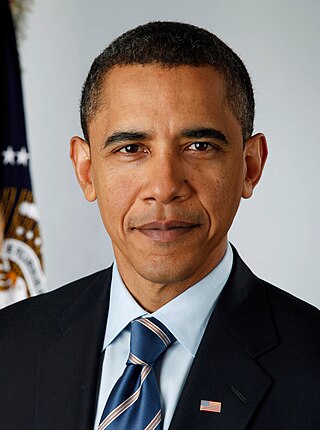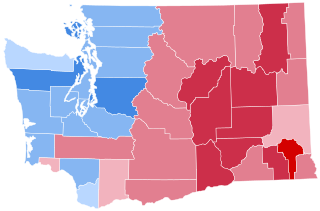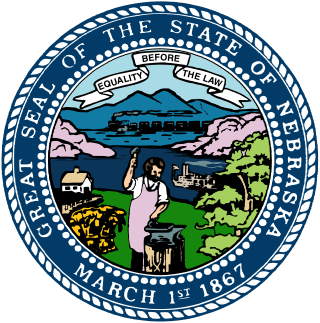In American politics, a superdelegate is a delegate to a presidential nominating convention who is seated automatically.

From January 3 to June 3, 2008, voters of the Democratic Party chose their nominee for president in the 2008 United States presidential election. Senator Barack Obama of Illinois was selected as the nominee, becoming the first African American to secure the presidential nomination of any major political party in the United States. However, due to a close race between Obama and Senator Hillary Clinton of New York, the contest remained competitive for longer than expected; neither candidate received enough pledged delegates from state primaries and caucuses to achieve a majority, without endorsements from unpledged delegates (superdelegates).

The 2008 Iowa Democratic presidential caucus occurred on January 3, and was the state caucuses of the Iowa Democratic Party. It was the first election for the Democrats of the 2008 presidential election. Also referred to as "the First in the Nation Caucus," it was the first election of the primary season on both the Democratic and Republican sides. Of the eight major Democratic presidential candidates, then-U.S. Senator Barack Obama of Illinois received the most votes and was ultimately declared the winner of the Iowa Democratic Caucus of 2008, making him the first African American to win the caucus and the first African American to win a primary state since Jesse Jackson in 1988. Former U.S. Senator John Edwards of North Carolina came in second place and then-U.S. Senator Hillary Clinton of New York finished third, though Clinton received more delegates than Edwards. Campaigning had begun as early as two years before the event.

The 2008 United States presidential election in Iowa took place on November 4, 2008, as part of the 2008 United States presidential election. Voters chose seven representatives, or electors to the Electoral College, who voted for president and vice president.

The 2008 Colorado Democratic presidential caucuses took place on Super Tuesday, February 5, 2008. As he did in every other state that held a caucus rather than a primary, Barack Obama won the caucus by a wide, two-to-one margin over Hillary Clinton.

The 2008 Kansas Democratic presidential caucuses took held on Super Tuesday, February 5, 2008, with 21 delegates at stake. The remaining 11 delegates were selected at the Kansas Democratic Party District Conventions on April 12. The state, and a majority of its delegates, were won by Barack Obama.

The 2008 Idaho Democratic presidential caucuses were held on Super Tuesday, February 5, 2008, with 18 national delegates at stake. For the first time, caucuses were held in all 44 counties, all of them open caucuses organized at the county level rather than the precinct level.

The 2008 North Dakota Democratic presidential caucuses took place on February 5, 2008, one of the many Super Tuesday nominating contests held that day. Barack Obama won the caucuses, securing 8 out of 13 national delegates.

The 2008 Hawaii Democratic presidential caucuses took place on February 19, 2008, with 20 pledged delegates at stake. The winner in each of Hawaii's two congressional districts was awarded all of that district's delegates, totaling 13. Another seven delegates were awarded to both candidates at the Hawaii Democratic Party State Convention on May 23–25, 2008. These 20 delegates represented Hawaii at the Democratic National Convention in Denver, Colorado. Nine other unpledged delegates, known as superdelegates, also attended the convention and cast their votes as well.

The 2008 Texas Democratic presidential primary and caucuses were a series of events to determine the delegates that the Texas Democratic Party sent to the 2008 Democratic National Convention. Delegates were selected using results from two sources: the Texas Presidential Primary held on March 4 by the Secretary of State of Texas's office, and a series of caucus events held between March 4 and June 7 by the Texas Democratic Party. The indecisive results of Super Tuesday, and the fact that Texas had the largest number of delegates among the states remaining on the Democratic primary calendar, resulted in the Texas primary receiving significant attention from both the Hillary Clinton and Barack Obama campaigns.

The 2008 United States presidential election in Washington took place on November 4, 2008, and was part of the 2008 United States presidential election. Voters chose 11 representatives, or electors to the Electoral College, who voted for president and vice president.

The 2000 Missouri Democratic presidential primary took place on March 7, 2000, as one of 15 states and one territory holding primaries on the same day, known as Super Tuesday, in the Democratic Party primaries for the 2000 presidential election. The Missouri primary was an open primary, with the state awarding 92 delegates towards the 2000 Democratic National Convention, of which 75 were pledged delegates allocated on the basis of the results of the primary.

In 2008, Virginia, for the first time since 1964, cast its electoral college presidential votes for a Democrat, Barack Obama. It also elected a United States senator, members of the United States House of Representatives, and local officers such as county board and school board members.

The 2012 United States presidential election in Minnesota took place on November 6, 2012, as part of the 2012 United States presidential election in which all 50 states plus the District of Columbia participated. State voters chose ten electors to represent them in the Electoral College via a popular vote pitting incumbent Democratic President Barack Obama and his running mate, Vice President Joe Biden, against Republican challenger and former Massachusetts Governor Mitt Romney and his running mate, Congressman Paul Ryan.

The 2012 United States presidential election in Washington took place on November 6, 2012, as part of the 2012 United States presidential election in which all 50 states plus the District of Columbia participated. Washington voters chose 12 electors to represent them in the Electoral College via a popular vote pitting incumbent Democratic President Barack Obama and his running mate, Vice President Joe Biden, against Republican challenger and former Massachusetts Governor Mitt Romney and his running mate, Congressman Paul Ryan.

The 2012 United States presidential election in Nebraska took place on November 6, 2012, as part of the 2012 United States presidential election in which all 50 states plus the District of Columbia participated. Voters chose five electors to represent them in the Electoral College via a popular vote pitting incumbent Democratic President Barack Obama and his running mate, Vice President Joe Biden, against Republican challenger and former Massachusetts Governor Mitt Romney and his running mate, Congressman Paul Ryan.

The 2020 Iowa Democratic presidential caucuses, the first nominating contest in the Democratic Party primaries for the 2020 presidential election, took place on February 3, 2020. Pete Buttigieg received the most state delegate equivalents (SDEs) and therefore the most delegates, with one SDE and two delegates more than Bernie Sanders, who had narrowly won the popular vote with 26.5%. It was the first time that the Iowa caucuses published the popular vote results of their contest. Buttigieg became the first openly gay person to ever earn the most delegates in a state's presidential contest in the United States. The Iowa caucuses were closed caucuses, wherein only registered members of a party were eligible to vote, and awarded 49 delegates to the 2020 Democratic National Convention, of which 41 were pledged delegates allocated on the basis of the results of the caucuses.

The 2020 Idaho Democratic presidential primary took place on March 10, 2020, as one of several states voting the week after Super Tuesday in the Democratic Party primaries for the 2020 presidential election. The Idaho primary required that voters would be registered Democrats or unaffiliated, and awarded 25 delegates towards the 2020 Democratic National Convention, of whom 20 were pledged delegates allocated on the basis of the primary results.

The 2020 Washington Democratic presidential primary took place on March 10, 2020, as one of several states voting the week after Super Tuesday in the Democratic Party primaries for the 2020 presidential election. The state-run semi-open primary, which was used instead of party-run caucuses for the very first time by Washington's Democrats, awarded 109 delegates to the 2020 Democratic National Convention, of which 89 were pledged delegates allocated according to the results of the primary.

The 2020 Wyoming Democratic presidential caucuses had been scheduled to take place on April 4, 2020 in the Democratic Party primaries and caucuses for the 2020 presidential election, but in-person voting was cancelled due to the COVID-19 pandemic and mail-in voting was extended to April 17, 2020. The Wyoming caucuses were a closed caucus, with the state awarding 18 delegates to the 2020 Democratic National Convention, of which 14 were pledged delegates allocated on the basis of the results of the caucus. Voters cast ranked-choice voting ballots, with a voter's ballot counting for four ranked backup choices if their original choice was in last place and below the 15 percent threshold for winning delegates.


















